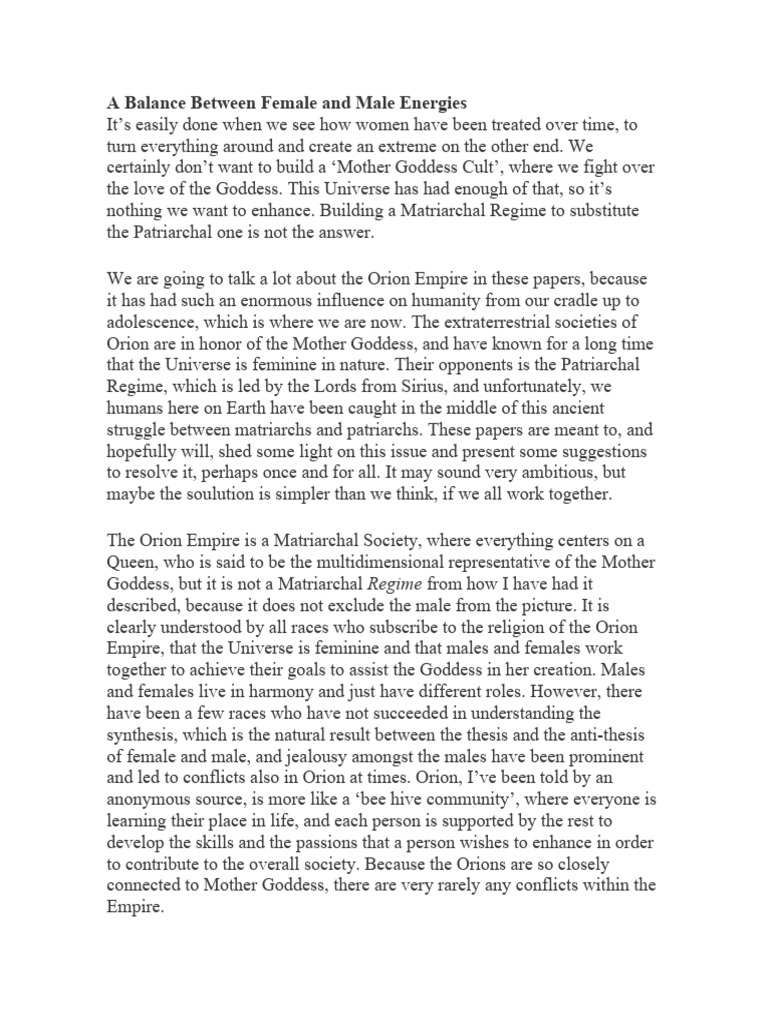The exploration of the themes of energy, gender, and materialism within the Bahá’í teachings invites a profound inquiry into the nature of existence and the intricate dynamics that govern human interaction. Within this framework, the balance between feminine and masculine energies emerges as a pivotal focus, challenging individuals to strive for equilibrium in both personal and communal spheres.
Firstly, it is essential to delineate the foundational concepts of energy and gender from a Bahá’í perspective. The teachings articulate that both masculine and feminine energies coexist within the human experience, albeit often skewed in favor of one over the other due to societal norms and materialistic pursuits. The inquisitive mind might ponder: How does the imbalanced representation of these energies hinder the prolific potential of humanity?
The Bahá’í view elucidates that both energies are not confined to biological definitions but are rather dynamic principles interwoven into the fabric of our reality. Masculine energy is frequently associated with attributes such as assertiveness, rationality, and authority. In contrast, feminine energy embodies qualities such as empathy, nurturing, and intuition. The interplay of these energies is not merely a philosophical abstraction; it operates at the core of Bahá’í community life, encouraging an inclusive environment where diverse attributes can thrive harmoniously.
However, the pervasive materialism of contemporary society often eclipses this balance, leading to a distortion of values that prioritize competition and individualism over cooperation and unity. The Bahá’í teachings urge humanity to transcend such materialistic inclinations, emphasizing that true development is rooted in the cultivation of spiritual virtues. This prompts a further inquiry: Can society truly flourish when it prioritizes material gain over holistic well-being and interpersonal harmony?
The challenge lies in recognizing that materialism can sedate the soul’s aspirations. The Bahá’í teachings articulate that the pursuit of material wealth, when taken to an extreme, engenders a deep spiritual void, engendering an existential malaise that permeates individual lives and societal structures. As individuals become ensnared in the relentless pursuit of possessions, the intrinsic balance of energy becomes increasingly skewed, with a proclivity toward masculine energy dominating the societal narrative.
This tension manifests in various dimensions of human experience, often leading to a detachment from one’s spiritual essence. The Bahá’í writings encourage adherents to engage in conscious reflection on the pursuit of material goods and to temper ambitions with a sense of service and community welfare. The essential challenge posited by the teachings is to engage with the world without becoming ensnared by it; to channel energies not just for individual benefit, but to foster an environment where both men and women can contribute equitably to the societal good.
Central to this dialogue is the notion of collaboration across genders. In a world increasingly characterized by polarization, the Bahá’í perspective champions the idea that unity is not merely a lofty ideal but a practical necessity for global progress. By embracing the strengths that each gender brings—men with their decisiveness and women with their compassion—communities position themselves better to address pressing challenges, be they social, economic, or environmental. This synthesis of energies cultivates a dynamic societal fabric capable of adapting and evolving.
A critical component of effecting this change lies in education and the empowerment of both genders. The Bahá’í teachings staunchly advocate for equal rights and responsibilities for all, denouncing any form of discrimination. Education serves as the keystone, providing individuals with the means to transcend outdated paradigms and to engage critically with the world around them. The prospect of harmonizing energies and combatting materialism hinges on the ability of individuals to recognize their potential and contribute meaningfully to the collective wellbeing.
Moreover, the application of these principles extends beyond the personal sphere to that of institutions and governance. The Bahá’í leadership model envisages consultation as a means to incorporate diverse perspectives, thereby reflecting the balance of both energies in decision-making processes. This paradigm fosters an environment where the voices of all community members are honored, and biases are confronted, mitigating the distortive effects of materialism.
The interconnection of energy, gender, and materialism presents an intricate tapestry demanding thoughtful engagement. As society grapples with the implications of imbalanced energies, there is a clarion call from Bahá’í teachings to elevate discussions on gender, not as a debate over supremacy but as a cooperative journey toward shared destiny. Therein lies the paradoxical challenge: can societies committed to progress genuinely elevate the feminine energy while dismantling the hierarchical structures imposed by materialistic ideologies?
Ultimately, the striving for balance between feminine and masculine energies within the framework of Bahá’í teachings constitutes a transformative endeavor. It calls upon individuals to reflect on their roles not only as economic agents but as custodians of a greater spiritual legacy. By emphasizing service, education, and unity, the teachings offer a beacon guiding humanity toward a future enriched by diversity and grounded in equitable principles. The pursuit of balance, therefore, emerges not just as an ideal but as an imperative for the evolution of a spiritually vibrant society.
